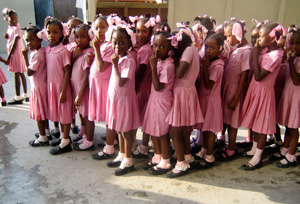
At École Marie-Esther in Port-au-Prince, pupils are lined up before a table piled high with plates filled with steaming rice and beans.
Credits: Development and Peace
The afternoon of the Haiti earthquake many children died or were left trapped in collapsed schools. An estimated 90 per cent of schools in Port-au-Prince were damaged or destroyed, leaving around two million children without access to education.
Literacy rates in Haiti were already low compared to global standards before the earthquake. The Haitian authorities emphasised that helping children return to school as quickly as possible was a priority.
Development and Peace (the Canadian member of the Caritas network) responded quickly to this appeal by supporting several religious communities that run schools and by investing in the rebuilding of schools and in training.
“After such a traumatic event, school can be very stabilising for children as it gives them back some sense of normalcy to their lives,” said Danielle Leblanc, Emergency Programs Officer for Development and Peace. “The desire to greet the children back was there, but the walls weren’t and many parents no longer had the financial means to send their children to school.”
A big investment was made in getting schools up and running again. As the year progressed, Caritas Italy meanwhile accompanied Haitians on the road to reconstruction and supported the rebuilding of primary schools in Port-au-Prince, Gressier, Jacmel, Thomazeau and Léogâne.
Caritas Italy also contributed to the creation of out of school activities for children, the training parish staff and the promotion of civic education.
Development and Peace provided funds to offer students a hot meal at the École Marie-Esther and École Saint-Antoine in Port-au-Prince. It also helped cover the costs of school fees, which went towards the purchase of school materials and teachers’ salaries.
In families where money was tight following the earthquake, school meals encouraged children to go to school. The nutritious meals such as rice, beans and chicken, helped children concentrate in the classroom and also keeps them healthy in general.
“It is truly important for us to have a meal here in this atmosphere of friendship, and especially for our parents, who always made sure we had food for our lunches. And especially after the earthquake, since many of our parents are having difficulty finding food to feed their children,” said Beverley Millford, a ninth grade student at the school.
